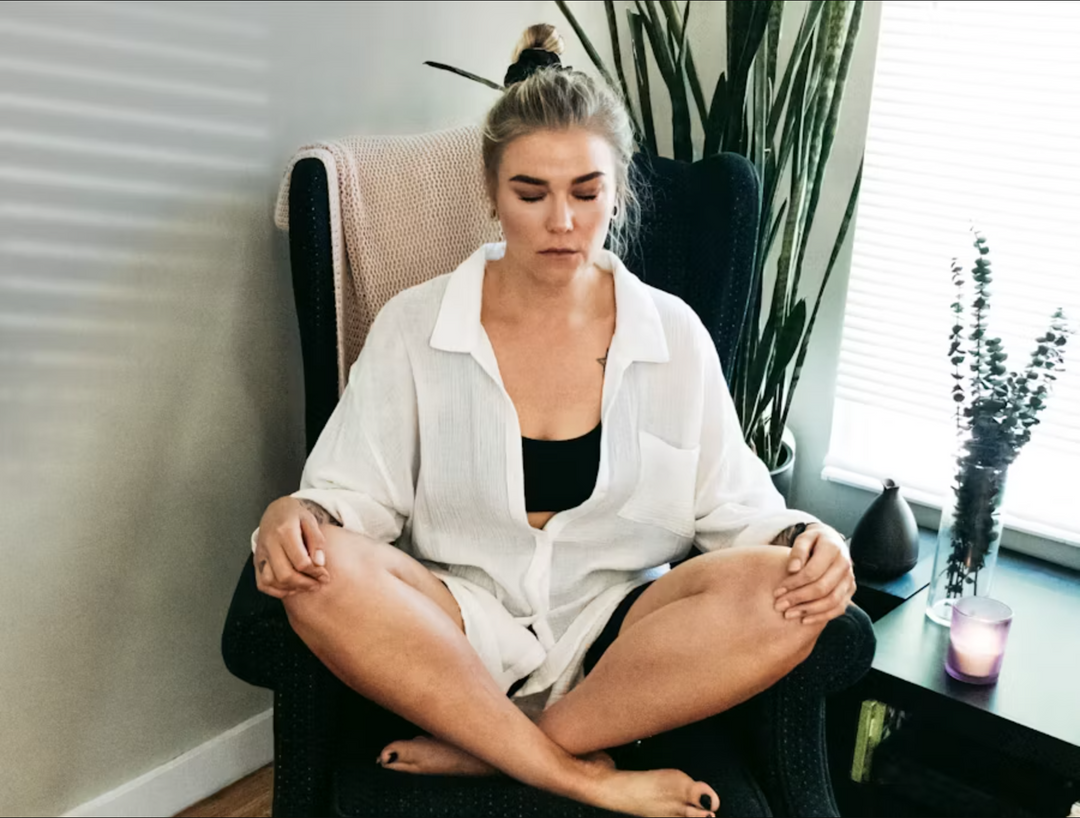
If you were wondering, "Does Yin Yoga tone your body?" the answer is yes, but perhaps not in the way you might expect. A great way to carry your essentials for this practice is with a yoga mat bag. Yin Yoga is a slow-paced practice that focuses on deeply stretching your superficial muscles, removing energetic blocks in your body, and exploring a deeper connection to your mind.
1. Does Yin yoga tone your body?

When you think of toning, do you think of heavily defined muscles, or do you think of repetitive strength? To understand whether Yin yoga tones your body, you will first have to explore your own definition of toning.
Here is what Yin yoga can do. It stretches and releases the muscles allowing them to rework their range of motion. It elongates them by reworking your ligaments and connective tissues with more space for your muscle to be used.
Yin yoga can be considered an internal toner, which works through your joints, bones, and all the in-between parts. This means the result of this toning may not even be that apparent other than increased flexibility.
Interestingly, this also factors into what kind of Yin yoga you do. The intensity and the type of poses you practice during this time will largely affect how much impact your muscles take.
Many people assume Yin yoga will tone them because they mistake it for Yang yoga. Yang yoga is the yoga you normally see everywhere, and it focuses on directly toning the muscles as opposed to Yin yoga which works indirectly. This is why you will not have the same toning result after intensive Yin yoga sessions as you do with normal yoga practices.
Yin yoga follows a passive energy of resting and holding still in one place to consistently hold gentle pressure to rework the body. This kind of activity has a larger impact on the range of motion than the mass of the body itself.
While many people claim Yin yoga tones them, it is important to notice if they also do other exercises too. Their toned body is usually a combined effort of cardio, walking, lifting, and other forms of movement rather than just Yin yoga. So to be very clear, Yin yoga can aid in toning the body and even provide a smoother ability to do other toning exercises.
When people think of toning, they think of an ultra-defined body; this is not necessarily what Yin yoga will offer. Toning is more than a large apparent difference in appearance; it can be a subtle change that includes being fitter and strengthening the muscles. This is where Yin yoga’s benefit lies, as it reworks the body holistically to become stronger.
In fact, if you think about it more carefully, Yin yoga tones your body well against being damaged. By toning parts of you that are stiff and considered to be not stretchable such as your bones, these elongated poses allow for your bones to have less chance of being injured as you go through life. Your range of motion decides your possible injuries too.
Most exercises other than yoga shorten the muscles due to how the muscle is stressed, whereas it’s the opposite in yoga. Yin yoga elongates the muscles, reducing stiffness while encouraging the increase of collagen in your body.
Yin yoga is a great way to gain strength for those who cannot exercise heavily, such as chronically ill people or postpartum women. Yin yoga tones you for strength gently and it is fascinating to see how!
At the same time, please consult a doctor before applying any exercise mentioned in this article.
2. What does Yin yoga do to your body?

This slow-paced meditative practice decreases your stress, sleep problems, and anxiety. In one way, it provides time for the body to slow down and energetically bring itself back to equilibrium. When you move through Yin yoga, you can let your life force realign to move according to your intentions.
In this practice, each pose allows your presence to feel the flow of energy or chi through your body as you hold space to create change. Yin yoga helps your ligaments, bones, and body stretch through gentle pressure applied for a long time. This delicate practice allows space to be created at points that otherwise pressurized could lead to damage.
Yin yoga hydrates your joints and prevents contracture from increasing your range of motion. The body then becomes a space to reconnect your mind and body and realign your chakras. Your body becomes fresher, more present, more mobile, and resistant to damage.
3. Does Yin yoga build muscle?

Think of Yin yoga as creating a stretch in all the parts that connect your muscles. In its practice, you will often have to relax your body and muscles in certain positions to create space for stress to be applied gently and consistently to create mobility.
In one way, this indirectly builds the muscles and elongates them as you start to hold a stretch for long periods of time. This gentle pressure concentrates energy on to your connective tissues, refining and building them, which directly affects your muscles during these positions.
Yin yoga creates strength. It adds to your joints, improves your range of motion, and reduces your chances of degenerative muscles. Ultimately, its oils and exercises the details or the cogs of your body rather than the big parts. This support is provided to your joints, to your bones, which are also connected to your muscles, bringing build eventually.
4. Is Yin yoga counted as exercise?

To understand if Yin yoga counts as exercise, explore its definition. If you define it as muscles being stressed and then released, the answer is yes! Yin yoga not only asks you to release the stress on your muscles but to stress to stretch your ligaments and bones.
This is just another form of specialized stretching being induced to create more mobility. If you define exercise as making an effort to move the body physically to increase or improve fitness, the answer is still yes.
While yoga has generally been debated whether it is an exercise, it’s important to remember what Yin yoga does to our body. It’s a movement that increases your flexibility and definitely adds to your fitness. You should know now! Don’t let it fool you; yoga has a great impact, despite not looking like an intensive Cardio or HIIT session.
Everyone has different exertion levels to be considered depending on the body part and frequency of exercise.
5. Can you lose weight doing Yin yoga?

This particular brand of yoga helps facilitate weight loss but not in the way you’d expect.
Interestingly, Yin yoga uses the concept of a relaxed body to create mobility in joints more easily. The same case goes for weight loss. Yin yoga holds space for the body to release passive energy and reach an equilibrium that not only aids digestion but also relieves pain and energizes itself. It aids it immensely.
This state of being relaxed and energized of a body equilibrium allows the body to burn off calories better when it comes to any weight loss plan you may already be on.
Let me tell you, a body stuck in flight or fight response will hold on tighter to its resources. A stressed body finds it harder to lose weight. Relaxing muscles and having mental and physical equilibrium will allow you to work for your best shape more easily.
6. How many times a week should you do Yin yoga?

This answer will be unique in accordance with your direct circumstances!
While some Yin yoga practitioners advise twice to thrice a week, I’d advise you to look at your own routine and stamina. Yin yoga is not restorative yoga and requires proper rest after every session to receive its full benefits.
This time should be balanced enough to receive good muscular benefits and restore your body.
Observe your own practice, and look for any side effects to decide your resting time. What works for you may not work for someone else! Moreover, the area you choose to focus on for your yoga also makes a difference.
Yin yoga for different muscle groups daily is more sustainable and less risky than prolonged pressure on the group all week. This rule always has exceptions, as it depends on your body. Time to observe your routine and optimize your capacity!
7. What to expect after Yin yoga?

After Yin yoga, you should expect yourself to rest. Your body has held safe amounts of prolonged stress states, and you might have found emotions pouring through the stillness of sessions. Give yourself time to process this experience physically and emotionally. Do not overdo it.
If we go into more detail, you can expect yourself to be tired and present with yourself and the energetic resources of your body. A dedicated practice of Yin yoga will bring pleasant change into your life. Not only will you embody discipline, but you will also understand the importance of patience and stillness.
Your body will be healthier, with lubricated joints, flexibility, longer muscles, and a better-curved spine. This practice will slow down the degeneration of tissues as your body reaches a healthy equilibrium. Yin yoga is a long-term investment. You’ll be a little sore, but now well aware of the importance of restoring!
Conclusion

In the end, Yin yoga teaches you the wonders that gentle, consistent pressure can do instead of aggressively pushing your body forward. This practice creates flexibility in your joints, tissues, and muscles but more than that of your mind. You expand and receive better in your yin energy, in your passivity.





